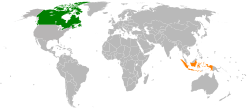| Revision as of 23:06, 6 June 2013 editGunkarta (talk | contribs)Extended confirmed users47,610 edits BBC poll← Previous edit |
Revision as of 15:26, 9 June 2013 edit undoLibStar (talk | contribs)Extended confirmed users, Pending changes reviewers, Rollbackers114,149 edits →Cooperations: rm copyvio from http://www.canadainternational.gc.ca/indonesia-indonesie/bilateral_relations_bilaterales/canada-indonesia-indonesie.aspxNext edit → |
| (One intermediate revision by the same user not shown) |
| Line 22: |
Line 22: |
|
}} |
|
}} |
|
</ref> Canada, through General ] as the President of the ]’ ], managed to break the deadlock in the negotiation on resolving the conflict between Indonesia and the ] that resulted in the adoption of Resolution 67/1949, which endorsed the establishment of a Tripartite Commission to hold negotiations with Indonesia and the Netherlands. The Tripartite negotiations lead to the international recognition of Indonesia’s sovereignty in December 1949. Canada also supported the development in Indonesia through the ] during the 1950s.<ref name="Indonesian Embassy"/> |
|
</ref> Canada, through General ] as the President of the ]’ ], managed to break the deadlock in the negotiation on resolving the conflict between Indonesia and the ] that resulted in the adoption of Resolution 67/1949, which endorsed the establishment of a Tripartite Commission to hold negotiations with Indonesia and the Netherlands. The Tripartite negotiations lead to the international recognition of Indonesia’s sovereignty in December 1949. Canada also supported the development in Indonesia through the ] during the 1950s.<ref name="Indonesian Embassy"/> |
|
|
|
|
==Cooperations== |
|
|
Canada and Indonesia have a long history of engaging in the promotion and protection of human rights, democracy, governance and pluralism. Counter-terrorism cooperation and capacity building is another key pillar of the bilateral relationship and Indonesia is also a participant in Canada’s Military Training Cooperation Program (MTCP). |
|
|
|
|
|
|
==Development assistance== |
|
==Development assistance== |
| Line 30: |
Line 27: |
|
|
|
|
|
==Trade== |
|
==Trade== |
|
Indonesia represents a growing market for Canadian goods, services, and investment. Many Canadian firms have a presence in Indonesia and directly employ tens of thousands of Indonesians. Canada and Indonesia cooperate to promote greater economic competitiveness and a more accountable business environment for Canadian and Indonesian businesses in the areas of financial services, infrastructure, the oil and gas sector, mining, aerospace and defence, information and communication technology, and agri-food products.<ref name="Canada"/> |
|
|
|
|
|
|
Data from the Indonesian Investment Coordinating Board shows Canadian investment in Indonesia for the period of 2005 up to 2011 consists of 37 projects worth US$ 157 Millions.<ref name="Indonesian Embassy"/> The major sector both by number of projects and investment value is still held by mining industry sector. The major location by number of projects remains in Java Island, but by amount of investment is located in Sulawesi. |
|
Data from the Indonesian Investment Coordinating Board shows Canadian investment in Indonesia for the period of 2005 up to 2011 consists of 37 projects worth US$ 157 Millions.<ref name="Indonesian Embassy"/> The major sector both by number of projects and investment value is still held by mining industry sector. The major location by number of projects remains in Java Island, but by amount of investment is located in Sulawesi. |
Indonesia-Canada diplomatic relations formally began when the two countries signed an agreement to open diplomatic missions in their respective capitals on October 9, 1952. However, relations between the two countries started in 1948, when Indonesia was struggling to gain international recognition for its independence from its former colonial power in 1945. Canada, through General Andrew McNaughton as the President of the United Nations’ Security Council, managed to break the deadlock in the negotiation on resolving the conflict between Indonesia and the Netherlands that resulted in the adoption of Resolution 67/1949, which endorsed the establishment of a Tripartite Commission to hold negotiations with Indonesia and the Netherlands. The Tripartite negotiations lead to the international recognition of Indonesia’s sovereignty in December 1949. Canada also supported the development in Indonesia through the Colombo Plan during the 1950s.
As a development partner, Canada works closely with Indonesia to support sustainable economic growth and reduce vulnerability to poverty. The Canadian International Development Agency (CIDA) manages Canada's bilateral program for development assistance to Indonesia.
Data from the Indonesian Investment Coordinating Board shows Canadian investment in Indonesia for the period of 2005 up to 2011 consists of 37 projects worth US$ 157 Millions. The major sector both by number of projects and investment value is still held by mining industry sector. The major location by number of projects remains in Java Island, but by amount of investment is located in Sulawesi.

